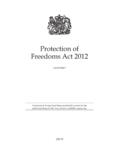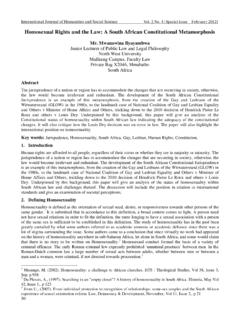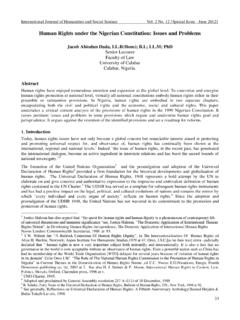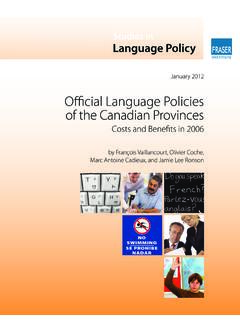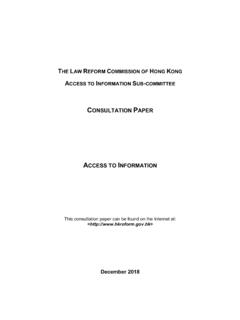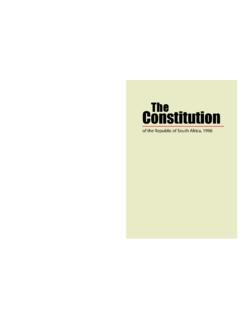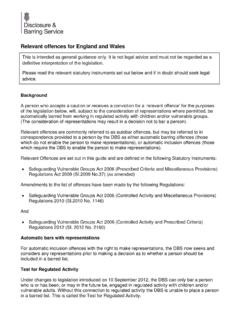Transcription of Judicial Service Commission Act: Code of Judicial Conduct
1 code OF Judicial CONDUCTADOPTED IN TERMS OF SECTION 12 OF THE Judicial Service Commission ACT, 1994(ACT NO. 9 OF 1994)PREAMBLEW hereas-1) the supremacy of the Constitution, the rule of law, and the rights and freedomsenshrined in the Bill of Rights are the foundation of the democracy established by theConstitution;2)section 165(1) of the Constitution provides that the Judicial authority of the Republicvests in the courts;3)section 165(2) of the Constitution provides that the courts are independent andsubject only to the Constitution and the law, which they must apply without fear,favour or prejudice;4)section 174(8) of the Constitution provides that before Judicial officers begin toperform their functions, they must take an oath, or affirm,in accordance withparagraph 6(1) of Schedule 2, that they "will uphold and protect the Constitution andthe human rights entrenched init, and will administer justice to all persons alikewithout fear, favour or prejudice, in accordance with the Constitution and the law.
2 ";5)section 180(b) of the Constitution provides that national legislation may provide forany matter concerning the administration of justice that is not dealt with in theConstitution, including procedures for dealing with complaints about Judicial officers;6) the Judicial Service Commission Act, 1994 (Act No. 9 of 1994) (hereinafter referred toas the Act), seeks to maintain and promote the independence of the office of judgeand judiciary as a whole, while at the same time acknowledging that it is necessary tocreate an appropriate and effective balance between protecting the independenceand dignity of the judiciary when considering complaints about, and the possibleremoval from office of, judges as defined in section 7(1)(g) of the Act, and theoverriding principles of openness, transparency and accountability that permeate theConstitution and that are equally applicable to Judicial institutions and officers;7)it is necessary for public acceptance of its authority and integrity in order to fulfil itsconstitutional obligations that the judiciary should conform to ethical standards that18No.
3 35802 GOVERNMENT GAZETTE, 18 OCTOBER 2012No. R. 86518 October 2012are internationally generally accepted, more particularly as set out in the BangalorePrinciples of Judicial Conduct (2001) as revised at the Hague (2002);8)Part II of Chapter 2 of the Act provides the legal framework for Judicial Conduct whichjudicial officers in South Africa must adhere to, and Part III and IV of Chapter 2 of theAct,particularly sections 14,15, 16, 17,18, 19 and 20 specify mechanisms,structures and procedures to be applied if a judge acts in a manner unbecoming ajudge in respect of any of the five grounds spelt out in section 14(4) of the Act;9)section 12 of the Act provides that the Chief Justice, acting in consultation with theMinister, must compile and maintain a code of Judicial Conduct , which must betabled by the Minister in Parliament for approval; and10) section 12(5), read with section 14(4)(b) of the Act, specifically provides that theCode of Judicial Conduct shall serve as the prevailing standard Judicial Conduct ,which judges must adhere to and that any wilful or grossly negligent breach of theCode may amount to misconduct which will lead to disciplinary action in terms ofsection 14 of the Act;PARLIAMENT of the Republic of South Africa therefore approves the code of JudicialConduct for Judges as follows:-Article 1: DefinitionsIn this code , unless the context otherwise indicates-(a)"the Act" means the Judicial Service Commission Act, 1994 (Act No.
4 9 of 1994); and(b)any word or expression to which a meaning has been assigned in the Act shall bearthe meaning so assigned to 2: Application(1)This code applies to every judge referred to in section 7(1)(g) of the Act who isperforming active Service and, unless the context indicates otherwise, also to-(a)a judge released from active Service and who is liable to be called upon to performjudicial duties; and(b)an acting judge.(2)A Judge not on active Service is bound by this code insofar as applicable.(3)Any wilful or grossly negligent breach of this code is a ground upon which acomplaint against a judge may be lodged in terms of section 14(4)(b) of the Act.(4)Complaints must be dealt with in accordance with section 14, read with sections15, 16, or 17 of the , 18 OKTOBER 2012No. 3580219 Article 3: Objects and Interpretation(1)The object of this code is to assist every judge in dealing with ethical andprofessional issues, and to inform the public about the Judicial ethos of the Republic.
5 (2)This code must(a)be applied consistently with the Constitution and the law as embodied in the commonlaw, statute, and precedent, having due regard to the relevant circumstances;(b)not be interpreted as impinging on the constitutionally guaranteed independence ofthe judiciary or any judge or on the separation of powers; and(c)not be interpreted as absolute, precise, or exhaustive. Conduct may therefore beunethical which, on a strict reading of this code , may appear to be permitted and theconverse also applies.(3)Although internationalstandards and those appliedincomparable foreignjurisdictions may not be directly applicable, they do provide a useful source of reference forinterpreting, understanding and applying this code .(4)Notes to Articles of this code are for the purpose of elucidation, explanation andguidance with respect to the purpose and meaning of the 4: Judicial IndependenceA judge must(a)uphold the independence and integrity of the judiciary and the authority of the courts;(b)maintain an independence of mind in the performance of Judicial duties;(c)take all reasonable steps to ensure that no person or organ of state interferes with thefunctioning of the courts.
6 And(d)not ask for nor accept any special favour or dispensation from the executive or anyinterest :Note 4(i): A judge acts fearlessly and according to his or her conscience because a judge isonly accountable to the 4( ii): Judges do not pay any heed to political parties or pressure groups and perform allprofessional duties free from outside 4(iii): Judges do not appear at public hearings or otherwise consult with an executive orlegislative body or official except on matters concerning the law, the legal system or theadministration of 4(iv): Judicial independence is not a private right or a principle for the benefit of judgesas denotes freedom of conscience for judges and non-interference in theperformance of their decision-making. It does not justify Judicial misbehaviour and does notprovide an excuse for failing to perform Judicial functions with due diligence or for otherwiseacting contrary to this 35802 GOVERNMENT GAZETTE, 18 OCTOBER 2012 Note 4(v): Organs of state are constitutionally mandated to assist and protect the courts toensuretheirindependence, impartiality,dignity,accessibility,and effectiveness.
7 Thecorrelative is the right of every judge not to have his or her independence of mind disturbedby any person or organ of 5: To act honourably(1)A judge must always, and not only in the discharge of official duties, acthonourably and in a manner befitting Judicial office.(2)All activities of a judge must be compatible with the status of Judicial :Note 5(i): A judge behaves in his or her professional and private lifein a manner thatenhances public trust in, or respect for, the judiciary and the Judicial 5(ii): A judge avoids impropriety and the appearance of impropriety in all the judge' 5(iii): A judge does not engage in Conduct that is prejudicial to the effective andexpeditious administration of the business of the 5(iv): Judicial Conduct is to be assessed objectively through the eyes of the 6: Compliance with the lawA judge must at all times, also in relation to extra- Judicial Conduct , comply with the lawof the 7.
8 EqualityA judge must at all times-(a)personally avoid and dissociate him- or herself from comments or Conduct by personssubject to his or her control that are racist, sexist or otherwise manifest discriminationin violation of the equality guaranteed by the Constitution;(b)in court and in chambers act courteously and respect the dignity of others;(c)in conducting Judicial proceedings, give special attention to the right to equality beforethe law and the right of equal protection and benefit of the law; and(d)in the performance of Judicial duties refrain from being biased or :Note 7(i): These provisions are aimed at promoting courtesy and ensuring a degree , 18 OKTOBER 2012No. 3580221 Note 7(ii): Judges strive to be aware of and understand the many differences betweenpersons and to remain informed about changing social attitudes and 7(iii): The multi-cultural nature of South African society calls for special sensitivity forthe perceptions and sensibilities of all who are affected by court 8: TransparencyA judge must-(a)take reasonable steps to enhance the accessibility of the courts and to improve publicunderstanding of Judicial proceedings; and(b)unless special circumstances require otherwise(i) Conduct Judicial proceedings.
9 And(ii) make known his or her decisions and supporting reasoning,in open :Note 8(i): The legitimacy of the judiciary depends on the public understanding of andconfidence in the Judicial 8(ii): The function of the judiciary fails if its proceedings are not 8(iii): Judges are conscious of the desirability of complying with the spirit of therequirement that proceedings should take place in open (iv): A judge avoids unnecessary discussioninchambers( thelegalrepresentatives in the absence of the parties) of matters that may be relevant to the merits ofthe 8(v):If what has happened in chambers has any effect on the proceedings, those factsare to be placed on record in open 9: Fair trialA judge must-(a)resolve disputes by making findings of fact and applying the appropriate law in a fairhearing, which includes the duty to(i)observe the letter and spirit of the audi alteram partem rule;(ii)remain manifestly impartial; and(iii)give adequate reasons for any decision;(b)in conducting Judicial proceedings-(i)maintain order;(ii)act in accordance with commonly accepted decorum; and(iii) remain patient and courteous to legal practitioners, parties and the public, andrequire them to act likewise;22No.
10 35802 GOVERNMENT GAZETTE, 18 OCTOBER 2012(c)manage legal proceedings in such a way as to-(i)expedite their conclusion as cost-effectively as possible; and(ii)not shift the responsibility to hear and decide a matter to another judge; and(d)not exert undue influence in order to promote a settlement or obtain a concession fromany :Note 9(i): The duty to grant a party a fair hearing does not preclude a judge from keeping afirm hand on proceedings. In general-(a)reasonable time limits may be laid down for argument, which may also be cut shortwhen the judge is satisfied that further argument would not be of material assistance;(b)the examination and cross-examination of witnesses should be curtailed ifit exceedsreasonable bounds; and(c)applications for postponement and the like must be scrutinised for real merit and mustbe dealt with firmly and 9(ii): Reasons for decisions must be clear, cogent, complete and succinct.










